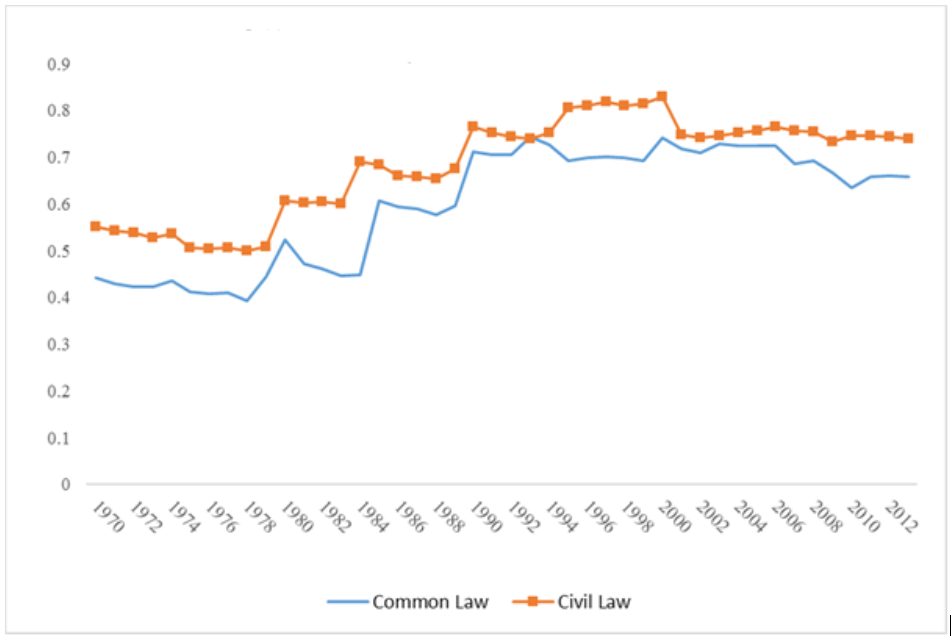Does the colonial history of sub-Saharan African countries still play a role in their economic performance? Ioannis Bournakis (SKEMA Business School), Marian Rizov and Dimitris Christopoulos compared the performance of 35 of these countries over more than 40 years: those that inherited a French legal framework were more efficient than those that inherited a British legal framework.
Do legal origins matter for African countries’ economic performance? Can the interplay between ethnic fragmentation and the legal system in Africa explain income per capita? These are two of the main questions we dealt with in our recent paper published in Economic Modelling.
Post-colonial African colonies inherited the colonizers’ legal system. African nations are ethnically heterogeneous because colonial borders were drawn randomly without capturing local racial configurations and traditions. Ethnic heterogeneity measures ethnic diversity within society using linguistic, religious and cultural criteria. When societies are ethnically fragmented, it becomes difficult to coordinate and agree on resource use and policy design regarding taxes, labour legislation, and public policies. This study asks which legal structure is more appropriate to deal with tensions among ethnic groups. This is to promote political stability and effective economic governance. We consider two main legal prototypes, French Civil law and British Common law.
Civil law vs. Common law
French colonial rule is characterized by a centralized state that subjects ethnic groups to central administration without assigning power to local entities. On the other hand, the British style of colonialism was much less dependent on metropolitan power with local elites being more powerful in maintaining the existing quo. After independence, former French colonies were governed by a more centralized bureaucracy that decided everything concerned about public policy (education and health provision, social security etc), while in former British colonies private markets played a more dominant role in economic life (more private schools and hospitals, smaller welfare state, etc.) with the state holding only a regulatory role. In the African experience, we see often ethnic groups fighting for control over the natural resources that constitute the main source of the government for financing all other public goods (education, health, pensions, social benefits, etc.). Therefore, civil wars and political instability are commonly found in ethnically heterogeneous societies.
Read also: France-Africa: the post-colonial divorce
In former French colonies that operate under civil law, the state retains a hegemonic role and monopolistic power over public policies. This does not make it easy for non-state the established regime. In former British colonies that operated under Common law, the state’s role is weaker. This makes ethnic groups compete for the control of natural resources easier. Ethnic groups that are excluded from the state organization tend to act violently against the dominant elite. This results in conflict, civil wars and higher political fragility.
French colonies in SSA have 2.55 times higher political stability
We test empirically the hypothesis that former French colonies are better suited to enhancing economic performance in ethnically heterogeneous societies because the centralized state can enforce coordination among ethnic groups. Contrary to the decentralized governance system in former British colonies which results in more ethnic conflicts, less stable economic environment and lower GDP per capita.
National Efficiency Scores 1970-2013, 35 SSA Countries

Our evidence is derived from 35 SSA countries from 1970-2013. Our main findings indicate that formerly French colonies with high levels of ethnic fragmentation have 45% higher GDP per capita than formerly British colonies. Former French colonies in SSA have 2.55 times higher political stability. As we control for more country characteristics, we found that former French colonies that are ethnically fragmented can produce 48.9% more GDP per capita relative to ex- British colonies that are also ethnically fragmented. According to our results, centralized governance maintains the status quo and ensures a more equitable distribution of national resources in society. Our analysis does not necessarily imply that countries with French Civil law (formerly French colonies) are better democracies. Instead, heterogeneous societies following the French colonial legacy tend to suffer from fewer conflicts and enjoy higher political stability.
And now, let’s hear from the historians
Two points deserve further attention in our analysis. Firstly, although the French civil law system can enforce coordination better, former French colonial democracies may suggest a less pluralistic institutional democracy. Indeed, countries like Angola, Chad and Mali (formerly French colonies) are classified as autocratic regimes. Nonetheless, this is not an artifact of the colonial style as both former French and British colonies may end up as autocracies. Second, the political stability associated with French Civil law might only reflect that France intervened militarily in postcolonial Africa more than fifty times to secure this stability. The second caveat deserves further investigation by analysts and historians.






